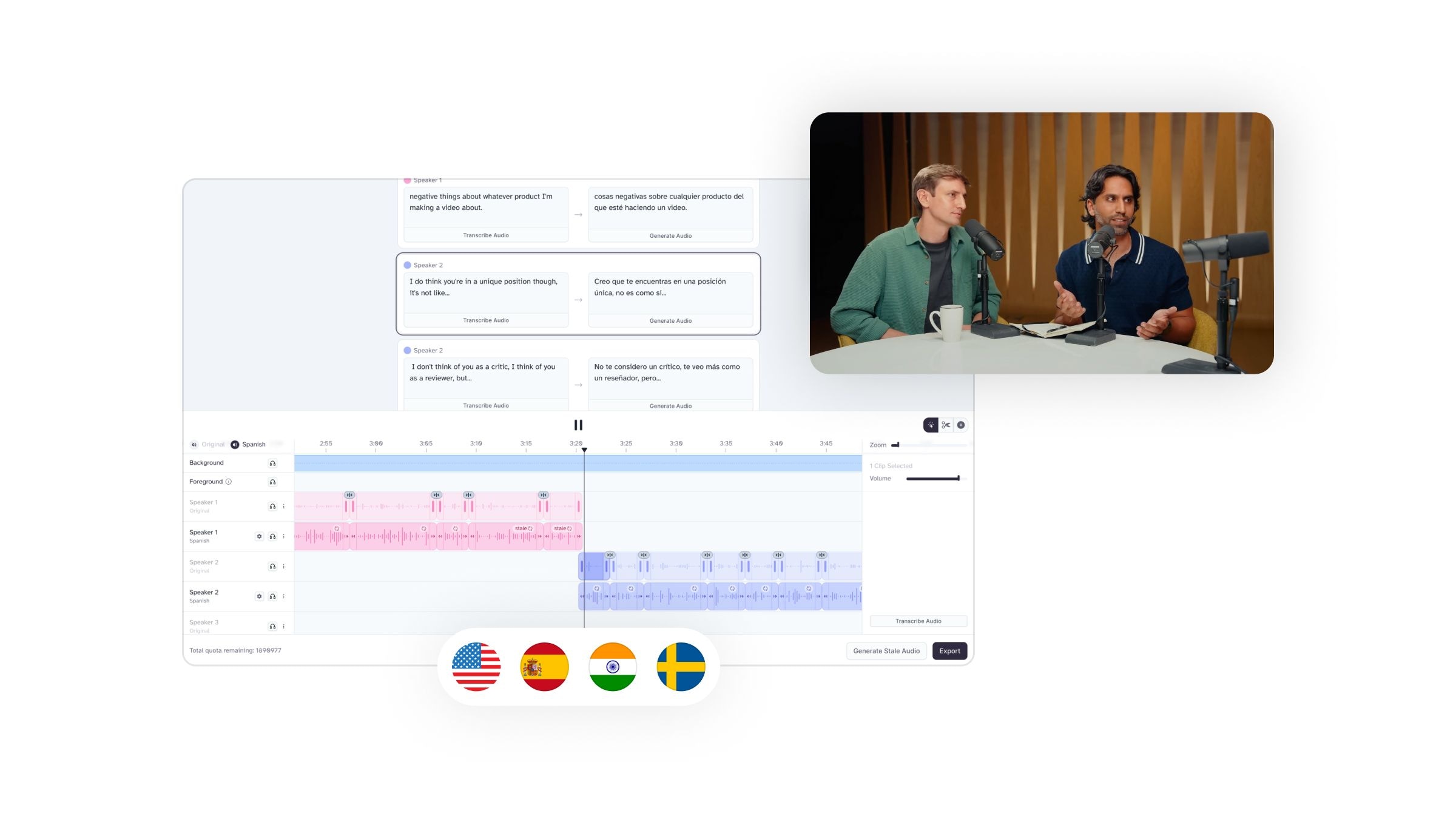
Tłumacz audio i wideo, zachowując emocje, timing, ton i unikalne cechy każdego mówcy
Poznaj zawiłą sztukę dubbingu gier wideo, od pokonywania wyzwań tłumaczeniowych po kluczową rolę technologii AI
"All your base are belong to us." "A winner is you!" "I feel asleep." Co łączy te dziwne frazy? To są słynne błędy tłumaczeniowe w grach wideo.
Jak wiedzą gracze, lokalizacja i dubbing gier wideo są niezwykle trudne do perfekcyjnego wykonania. Sztuka dubbingu gier wideo to delikatny taniec między zachowaniem istoty oryginału a przyciąganiem widzów na całym świecie.
Ale teraz AI ma transformacyjny wpływ na branżę gier — a proces dubbingu nie jest wyjątkiem.
Dubbing gier wideo to technika lokalizacyjna polegająca na zastąpieniu oryginalnego dubbingu gry nowymi nagraniami w innym języku. Robi się to, aby gra była bardziej dostępna i przyjemna dla graczy, którzy mogą nie znać oryginalnego języka.
Tradycyjnie dubbing wymaga zespołu tłumaczy, aktorów głosowych i inżynierów dźwięku, którzy współpracują, aby stworzyć nową ścieżkę dźwiękową pasującą do wizualizacji i fabuły gry.
Dubbing gier wideo to nie tylko tłumaczenie — to dialog kulturowy. Starannie dostosowuje odniesienia kulturowe, humor i powiedzenia, aby trafić do graczy na całym świecie, tworząc doświadczenie gamingowe, które jest tak samo autentyczne, jak i porywające.
Wpływ dubbingu na międzynarodowy rynek gier jest ogromny. W 2024 roku rynek gier wideo ma osiągnąć oszałamiający przychód w wysokości 282,30 mld USD, więc deweloperzy gier, którzy chcą dotrzeć do tej ogromnej globalnej publiczności, muszą priorytetowo traktować najwyższej jakości dubbing.
Nic dziwnego, że gry, które przechodzą skrupulatną lokalizację i dubbing, często odnotowują znaczny wzrost sprzedaży w porównaniu do swoich nietłumaczonych odpowiedników. Mówienie do graczy w ich języku, używanie odniesień i powiedzeń, które znają, czyni je bardziej immersyjnymi. I ostatecznie bardziej przyjemnymi.
Tradycyjny proces dubbingu to ogromne przedsięwzięcie, wymagające dużo czasu, wysiłku i kosztów. Obejmuje kilka kluczowych kroków.
Profesjonalni tłumacze dokładnie tłumaczą oryginalny scenariusz gry na docelowy język, uwzględniając jego kulturową istotność.
Reżyser castingu wybiera odpowiednich aktorów głosowych do odgrywania postaci z gry, biorąc pod uwagę jakość głosu, umiejętności aktorskie i odpowiedniość do ról.
Aktorzy głosowi nagrywają swoje dialogi w studiu, pod kierunkiem reżysera.
W przypadkach, gdy synchronizacja ruchu warg jest konieczna, aktorzy synchronizują występy z ruchami warg postaci na ekranie
Inżynierowie dźwięku edytują i miksują nagrane dialogi z ścieżkami dźwiękowymi gry dla lepszego efektu
Testowanie i poprawianie błędów oraz niespójności
Lingwiści i eksperci kulturowi sprawdzają dokładność językową i kulturową, uwzględniając niuanse języka docelowego
Po zakończeniu wszystkich poprawek i dostosowań, finalna wersja z dubbingiem jest zintegrowana z grą, gotowa do dystrybucji dla graczy na całym świecie.
Ten tradycyjny proces dubbingu zapewnia, że zlokalizowana wersja gry utrzymuje tę samą jakość i immersję co oryginał, pozwalając graczom z różnych środowisk językowych cieszyć się pełnym doświadczeniem gamingowym.
Ale innowatorzy, tacy jak ElevenLabs, otwierają możliwość dla deweloperów na automatyzację tego procesu, skracając ten długi proces do sekund.
Tradycyjny proces dubbingu jest skomplikowany i czasochłonny, co czyni go kosztownym przedsięwzięciem.
Najpierw deweloperzy muszą zatrudnić tłumaczy i aktorów głosowych. Ale samo zatrudnienie to dopiero pierwszy krok. Następnie muszą zaplanować wiele sesji nagraniowych, jednocześnie zapewniając spójność w różnych językach i zachowując ducha oryginalnych występów głosowych.
Co więcej, tłumaczenie humoru, idiomów i odniesień kulturowych dla globalnej publiczności może być trudnym procesem, wymagającym wielu wkładów od ekspertów lokalizacyjnych.
Aby pokonać te wyzwania, studia gier coraz częściej sięgają po innowacyjne narzędzia AI, aby usprawnić proces tworzenia gier.
Wykorzystanie AI w dubbingu gier oferuje kilka transformacyjnych korzyści.
Po pierwsze, dubbing zasilany AI może znacznie przyspieszyć proces tworzenia gier, automatyzując różne zadania, takie jak tłumaczenie scenariusza i synteza głosu. Na przykład, dubbing zasilany AI od ElevenLabs może lokalizować filmy na 29 języków w kilka sekund.dubbing może lokalizować filmy na 29 języków w kilka sekund.
Zobacz, jak działa studio dubbingowe, oglądając poniższy film.
AI to także znacznie tańsza opcja, eliminująca potrzebę zatrudniania wielu aktorów głosowych i przeprowadzania rozległych sesji nagraniowych przez deweloperów gier wideo. Ta opłacalność sprawia, że lokalizacja gier wideo jest bardziej dostępna dla niezależnych deweloperów i mniejszych studiów.
Co więcej, rozwiązania AI są z natury skalowalne. Deweloperzy mogą używać zamiany tekstu na mowę ElevenLabs do niemal natychmiastowego tworzenia głosów w jednym języku, zanim przejdą do studia dubbingowego aby przetłumaczyć to na wiele języków (29 w przypadku ElevenLabs).
Wykorzystując moc narzędzi AI pakiet dubbingowy ElevenLabs, dubbing gier wideo jest szybszy, tańszy i łatwiejszy niż kiedykolwiek wcześniej. I będzie tylko lepiej w przyszłości.
Dubbing gier wideo, lokalizacja gier wideo i aktorstwo głosowe w grach odgrywają kluczową rolę w tworzeniu uniwersalnie angażujących narracji gamingowych.
Pojawienie się AI w narzędziach do dubbingu gier, takich jak AI Dubbing Suite ElevenLabs zmienia branżę, czyniąc proces szybszym, bardziej opłacalnym i elastycznym, przy jednoczesnym zachowaniu wysokiej jakości i wspieraniu innowacji.
Gotowy, aby samemu wypróbować dubbing zasilany AI?Zarejestruj się już dziś.

Tłumacz audio i wideo, zachowując emocje, timing, ton i unikalne cechy każdego mówcy


The most data-driven way to improve real-world agent performance.